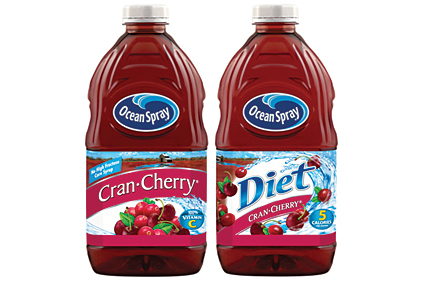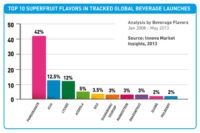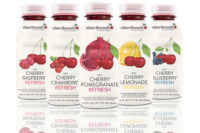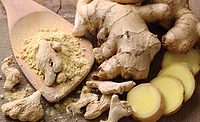As consumers’ taste preferences shift away from intensely sweet and toward tarter flavor profiles, cherries have an opportunity to fill the flavor gap, according to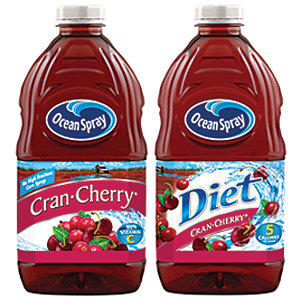 experts.
experts.
“There’s a real trend in the marketplace — foodservice as well as retail grocery — toward more of a sweet, tart taste than just intensely sweet taste,” says Jeff Manning, chief marketing officer of the Cherry Marketing Institute, Lansing, Mich.
As a result, Manning believes cherry juice is on the verge of becoming a mainstream flavor, he says.
“Tart cherries have a very distinct, very sophisticated taste, and I think that’s going to emerge as much more mainstream now than in the past,” he explains.
Tart cherries, also known as red sour pie (RSP) cherries, have become more popular in recent years due to new evidence and awareness of their health benefits, says Greg Kaiser, president of San Dimas, Calif.-based Encore Fruit Marketing Inc., which offers purees, puree concentrates, not-from-concentrate juices and juice concentrates for both tart and dark, sweet cherries. However, dark, sweet cherries have been established longer in the marketplace as a mainstream beverage flavor in both juice blends and pure juices, he says.
“Considering their histories and consumer preferences, I see the RSP-type cherry as having more upside growth potential due to its perceived health benefits,” Kaiser says.
For instance, research has shown that tart cherries have a high level of melatonin and aid in muscle recovery, says Jim Bryant, vice president of the ingredients division of Traverse City, Mich.-based Cherry Central Cooperative Inc., which offers Montmorency tart cherry concentrates and purees.
Alexander G. Schauss, senior research director of natural and medicinal products research for AIBMR Life Sciences Inc., Puyallup, Wash., points to two studies that have linked the melatonin levels found in tart cherry juice with enhanced sleep quality. He also notes that consumption of tart cherry juice might lower the risk of cardiovascular disease, age-related cognitive impairment and certain cancers, according to a study published in The Journal of Nutrition in 2009. The results of the study were attributed to the high levels of anthocyanins and other phytochemical compounds in tart cherries, he says.
“Given these properties and many others, in addition to the fruit’s high content of anthocyanins, known for their antioxidant activity and anti-inflammatory bioactivity, tart cherry’s attributes make it an excellent candidate to join the growing category of superfruits currently attracting consumers,” Schauss says.
Tart cherries also are higher in antioxidants than dark, sweet cherries and act as an anti-inflammatory, which can help to reduce the symptoms of arthritis, adds Jeannie Swedberg, director of business development for Tree Top Inc., Selah, Wash. In fact, tart cherries ranked No. 14 on a list of the Top 50 foods with the highest antioxidant content per serving size, according to “The Red Report,” commissioned by the Cherry Marketing Institute.
Studies also have linked the fruit to reducing cholesterol, improving heart health and helping with weight loss, says Erin Gipe, product development manager for Northwest Naturals, a wholly owned subsidiary of Tree Top.
Tree Top offers tart and dark, sweet cherry juice concentrates for juices and juice drinks as well as single-strength and concentrated fruit purees and drum-dried flake powders, which contain a high level of insoluble solids and are primarily used in nectar- or smoothie-type applications, Swedberg says. Northwest Naturals also offers tart and dark, sweet cherry juice concentrates as well as With Other Natural Flavors (WONF) varieties and essences, Gipe says. Its WONF options use a combination of 100 percent juice concentrates but are less expensive than its pure cherry concentrates and also feature more consistency in color, acidity and flavor, she adds.
The company also developed a cherry blossom blend WONF and a Rainier cherry WONF, which are popular in the Northwest and feature a flavor profile somewhere in between a sweet cherry and a tart cherry, Gipe explains.
“I do believe that consumers are becoming more and more aware of cherries being a home-grown superfruit, and consumers are associating that antioxidant value with heart health, immune system [support], cancer prevention, brain health and beauty from within,” Tree Top's Swedberg says.
Additionally, cherries add value to products, the Cherry Marketing Institute’s Manning adds. Therefore, juice blends such as apple and cherry or pear and cherry that offer a sweet and tart flavor are becoming more popular, he says.
Encore Fruit Marketing’s Kaiser adds that tart cherries blend well with juices like cranberry juice, while dark, sweet cherries work well with juices like blueberry juice.
“It is a nice option to have two different types of cherry for flavor blending and still keep cherry on the label as an ingredient,” Kaiser says.
Steve Corson, research chef with Northwest Naturals, also points out an opportunity for authentic cherry juices.
“Oftentimes cherry, from a consumer perspective, is cough syrup cherry, so I think there’s a little bit of room to do a very tasty RSP cherry or cherry blend that actually tastes more like the actual fruit rather than candy,” he says.
